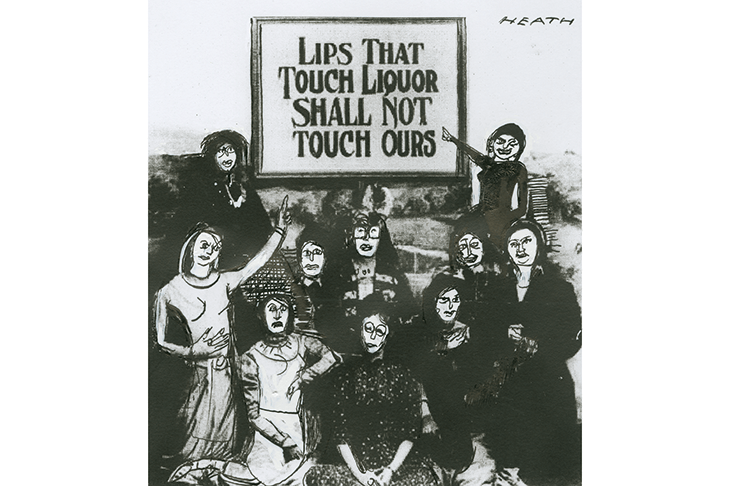When my husband and I arrived in our adored Amsterdam on a sun-drenched schoolday afternoon — less than an hour in the air, first row on the plane, merry but not messy — we seemed all set for a brilliant time. We’re both Brexiteers and ever since Freedom Day we’ve been especially keen on European city breaks, such visits now having the pleasing feeling of a romance whose days are numbered, and from which one would be wise to squeeze the sweetness while one may. After checking in to the hallucinogenically gorgeous W Hotel, I was struck by one of the most enchanting of emotions the non-needy can experience; of strolling out on a summer evening in a place where no one knows you. Including, as it turned out, myself.
Something which adds to the dreamlike feeling of Amsterdam is how similar in some ways it is to England — the language with its ‘Hallo’ and ‘Dank U’ — which gives it the oddness of Philip Pullman’s alternative Oxford. Unlike my own beloved Brighton, where stag parties can be viewed all over town drinking their breakfast, Amsterdam appears to have lost a lot of marauding male tourist gangs to the cheaper, harsher stamping grounds of the ex-Soviet eastlands, and now seems to host more hens, inquiring politely where the red light district is. Talk even in a raised voice outside the approved perving playpen — let alone smoke anything — and you’re liable to get a very old-fashioned look indeed from a local. In short, the Dutch seem to be just like the English — if we’d ever grown up.
Like the mature people they are, the Dutch don’t virtue-signal — there is vice, and there is virtue, and one proceeds with each accordingly. In particular, they don’t use their estimated 880,000 bikes to virtue-signal — it’s just the smartest way to get around a city linked by around 1,250 narrow bridges. Unlike in Brighton, there are enviably few idiots on bikes as big as tractors riding hell for leather straight at pedestrians and believing this is somehow fine as they’re not emitting any fumes. Charmingly, there are groups of young women on their way to and from work, riding in perfect synchronicity, chatting and laughing like herds of mechanical birds.
They drink differently from us, too. And when I say us I mean me. It started out well — we took in a pop art exhibition and the Sex Museum and Ripley’s Believe It Or Not! — but already I could sense myself rushing ahead; I had a rendezvous with oblivion, and I could see it blowing kisses from the corner of my eye. I knew that the way my interesting, interested husband was behaving was the right way — a few beers, then a desire to experience the glorious city we were in — but I just couldn’t do it. From day three, we could have been anywhere there was booze; I’d wait till he was in the lavvy, go for the minibar — Bacardi: the Healthy Breakfast — then demand we go out and experience Amsterdam, when what I really meant was experience the numerous bars lining the canals.
The drink had caught up with me, rammed the glass slippers on to my numb feet and declared me The One, upon which they turned into the Red Shoes, whirling me away on a mad dance of drunkenness — except that makes it sound more exciting than it was. I drank myself into a stupor by noon, when I took to my bed, demanding Daniel have sex with prostitutes and sulking monstrously when he refused, pointing out that as we were going at it like rabbits my request was ludicrous as well as distasteful. For two days, my husband was my carer, while I cared only for alcohol.
Two swimming pools unswum in; four expensive breakfasts untouched; six museums unexplored — like some sottish, nihilistic version of the Twelve Days of Christmas. And even then as we packed — between spitting up blood — I still had the nerve to smirk smugly ‘That was fun, wasn’t it?’ ‘No,’ said D quietly. ‘You were really boring.’ I gaped at him, dumbstruck. Over the years, I’d been aware that my drinking exacerbated my tendencies to be a bitch, a bully and a braggart, and shamefully I’d been OK with this. But a bore — me? ‘Is he drunk?’ I wondered, incredibly, before the awful truth hit home.
Born into the British working-class, then at 17 becoming a journalist, it was predictable I’d become a drunk. And I’ve honestly loved these 40 years of binge and spree — but I feel now that if I don’t change my ways, I may well lose my marriage. Trickily, I can’t help thinking that it was the person I became through drinking — all that swagger, sass, sex-pestiness — which made my husband love me so much in the first place; without drink, I can’t help thinking I literally will not be myself. Lose myself, or lose my love, or lose both and keep my life? It’s a tough call.
Julie Burchill discusses her relationship with booze on the Spectator Podcast:







Comments